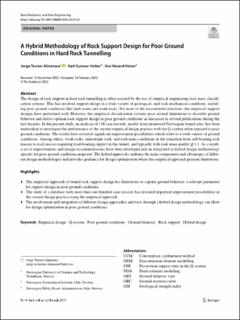A Hybrid Methodology of Rock Support Design for Poor Ground Conditions in Hard Rock Tunnelling
Peer reviewed, Journal article
Published version
Permanent lenke
https://hdl.handle.net/11250/3059185Utgivelsesdato
2023Metadata
Vis full innførselSamlinger
Originalversjon
10.1007/s00603-023-03273-8Sammendrag
The design of rock support in hard rock tunnelling is often assisted by the use of empirical engineering rock mass classification systems. This has involved support design in a wide variety of geological- and rock mechanical-conditions, including poor ground conditions like fault zones and weak rocks. For most of the encountered situations, the empirical support designs have performed well. However, the empirical classification systems pose several limitations to describe ground behavior and derive optimal rock support design in poor ground conditions as discussed in several publications during the last decades. In the present study, an analysis of 118 case records, mostly from monitored Norwegian tunnel sites, has been undertaken to investigate the performance of the current empirical design practice with the Q-system when exposed to poor ground conditions. The results have revealed significant improvement possibilities which relate to a wide variety of ground conditions. Among others, weak rocks, anisotropic rock, and rock mass conditions in the transition from self-bearing rock masses to rock masses requiring load-bearing support in the tunnel, and typically with rock mass quality Q < 1. As a result, a set of improvements and design recommendations have been developed and an integrated or hybrid design methodology specific for poor ground conditions proposed. The hybrid approach combines the main components and advantages of different design methodologies and provides guidance for design optimization where the empirical approach presents limitations.

